Commentary
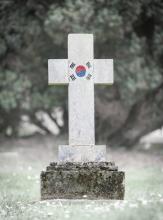
IN 1900, 1 percent of Korea’s population was Christian. By 2010, roughly 3 in 10 South Koreans were Christian, including members of the world’s largest Pentecostal church, Yoido Full Gospel Church, in Seoul. The faith has exploded, and so now have the questions.
Each of the past several summers in Washington, D.C., I’ve met with 50 young Christian leaders from South Korea to discuss biblical social justice as it applies to their Korean context and perspectives on our shared Christian faith. They highlighted challenges they face, such as confusing financial and church growth with God’s favor; the stress that youth face in their ambition for a viable career; and the roles sometimes assigned to women and men in both church and society.
They also posed a critical question: Do you think of yourself as a Christian first or an American first? Out of our deep exploration came three convictions: First, national identity can be a deep blessing, but it cannot be our primary identity. Second, discussion works best without immediately judging our priority lists or our neighbors’ lists harshly. Third, the order of our lists should never be the cause of harm.
These rich dialogues with Korean faith leaders set the stage for an unusual opportunity: attending the Global Forum for the Future of World Christianity held on Jeju, the politically contested island off the coast of South Korea.

SINCE JANUARY, more than 1,750 migrants have died or gone missing in the Mediterranean Sea. That is more than 30 times higher than during the same period last year, according to the International Organization for Migration. The United Nations estimated that, as of the end of May, 90,000 migrants had come across the Mediterranean into Europe so far in 2015.
Last summer, Christian Peacemaker Teams, an international NGO that places unarmed intervention teams in situations of conflict to reduce violence, launched CPT-Mediterranean on the Greek island of Lesbos to support migrants arriving by sea. I served with that team and heard survivors’ stories firsthand. So what is going on?
Eleven million people were displaced by violence last year, according to The New York Times, most driven out of Syria, Iraq, Ukraine, and Afghanistan. However, tens of thousands are also pushed north from sub-Saharan Africa, fleeing desperate poverty and violence. It’s the worst migration crisis since World War II, according to the United Nations.
In the past, most migrants into the European Union came by land. In Greece, they entered along the border with Turkey. In 2012, Greece built a fence along the Turkish border to stop migrants and refugees from coming into the country. This forced migrants to enter Europe along Greece’s border with Bulgaria. In 2014, a fence was erected there too, effectively cutting off a primary land route into the European Union.

[W]hen I was in junior high, I decided I wanted to become the first black woman ordained in the Lutheran Church. ... At Wesley I enjoyed being a student again, until one of the black seminarians asked, “How can you be black and be Lutheran?” I didn’t know. I had never thought about it. The Lutheran Church is predominantly white, ethnically German and Scandinavian. It is highly structured and without the display of lively emotions most blacks are used to in their religious experiences. The Lutheran Church was the only church I had ever really known, and yet suddenly I was thrust into an identity crisis that really rocked me.
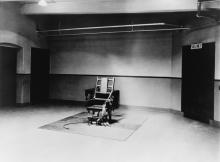
THE NATIONAL LATINO Evangelical Coalition announced in March that it would no longer support the death penalty, making it the first U.S. evangelical association to take this stand. Coalition president Gabriel Salguero announced the change at a press conference in Orlando, Fla., and urged NaLEC’s 3,000 member congregations to work toward ending capital punishment nationwide.
“As Christ-followers, we are called to work toward justice for all. And as Latinos, we know too well that justice is not always even-handed,” said Salguero.

WHEN YOU GIVE a luncheon, Jesus says, don’t invite your rich neighbors; instead invite the poor, the vulnerable, the outcast. I was reminded of Jesus’ words recently when President Obama came to Boston. Local foodies celebrated his stop at a hip restaurant. However, only the “rich neighbors” were invited: Thirty guests who had paid up to $33,400 each in political contributions were given the opportunity to lunch with the president.
Amazingly, a $33,000 lunch is pocket change for those now entitled, thanks to Citizens United, to the ears of our politicians. In the 2012 election, one multibillionaire spent $150 million to defeat Obama. Thirty-two super PAC donors, “giving an average of $9.9 million each, matched the $313 million that President Obama and Mitt Romney raised from all of their small donors combined—that’s at least 3.7 million people giving less than $200,” stated a 2013 report that examined Federal Elections Commission data.

IN APRIL, eight nations, including Iran, announced an agreement for addressing Iran’s controversial nuclear activities. The Iran Nuclear Framework, supported by many Christian leaders in the U.S., is seen as an opportunity to “dramatically restrain the capacity of Iran to acquire nuclear weapons.” It could be one of the most significant nonproliferation achievements in history.
The proposed agreement significantly reduces Iran’s capacity to enrich uranium, closes the plutonium path to weapons capacity, and greatly increases international monitoring and verification of Iran’s nuclear infrastructure. It allows for lifting sanctions against Iran and opens the door to the possibility of improved bilateral relations.
The multiyear agreement sharply curtails Iran’s enrichment program. Iran has agreed to reduce by approximately two-thirds its installed centrifuges, from about 19,000 today to 6,104 under the deal. And Iran has agreed not to build any new facilities for the purpose of enriching uranium for 15 years.

I WAS just 15, and as the eldest I had to do something to help my family. When the captain of our local army squadron introduced a recruiter to my parents, I was ready to go anywhere. He made it sound so nice! I would go to Japan and work in a famous hotel as a professional dancer. It would mean lots of money to send home to my poor family in the Philippines. Of course, I would have to go to Manila first to be trained, and I would have to change my name to fit my new life.

FOR SOMETHING as simple as sunlight, the solar energy industry can be a bit complicated. But that never stopped pastor Brian Flory from trying to see the light.
“Putting solar panels on the roof of our congregation was important to us,” said Flory, who runs the Beacon Heights Church of Brethren in Fort Wayne, Ind. “For us it seemed like a wonderful opportunity to live out the values that our faith was leading us toward.”
To live out one of the core values of his faith—being good stewards of God’s creation—Flory began the process of installing panels on his church’s roof in 2014. He’d barely raised the needed $20,000 to support the project when a bill in the Indiana state legislature nearly stopped him in his tracks.

BY CHANGING THE definition of marriage in its constitution from “between a man and a woman” to “between two people, traditionally a man and a woman,” the Presbyterian Church (U.S.A.) has joined a number of other religious groups in the U.S. in allowing same-sex marriage.
In so doing, the 1.75 million-member denomination completed a dramatic turnaround on marriage equality. In 2012—at a time when same-sex marriage was legal in only a handful of states—the 220th PC(USA) General Assembly was so deeply divided on the issue that it merely called for two years of “serious study and discernment” of Christian marriage.
The 2014 General Assembly—with nearly two dozen states by then having legalized same-sex marriage—voted 429-175 to recommend the constitutional change. By March of this year, the requisite majority of the PC(USA)’s 172 presbyteries (regional governing bodies) had ratified the proposal.
Reaction to the change was immediate, and predictable.

WHAT’S NOT TO like about a law called “right to work”?
It is a label that invokes the best of our U.S. national persona: a dedication both to individual freedom and to the important role that our labors play in developing personal character and community prosperity. When Wisconsin Gov. Scott Walker signed a so-called right-to-work law in early March, making his state the 25th in the country to adopt such legislation, he did so on a desk emblazoned with a bold sign saying “Freedom to Work.”
The problem with right-to-work laws is that they are a lie.
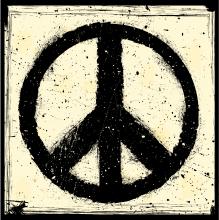
THE DEATH of former Israeli Prime Minister Menachem Begin on March 9 brought back memories of high hopes for Middle East peace. ... Begin’s passing also recalled his determination to establish Israeli settlements on the West Bank’s Occupied Territories, areas he called by their biblical names—Judea and Samaria. The day after his election as prime minister in May 1977, Begin visited one of the handful of settlements then in existence, Elon Moreh, to declare: “There will be many, many settlements in the coming weeks.”

IMMANUEL KANT has been on my mind as I’ve followed the national response to recent measles outbreaks. Kant, a German philosopher, emphasized the danger of a temptation we are all vulnerable to—the temptation to make special exceptions for ourselves. The person who acts against principles that she thinks others ought to follow becomes a kind of moral “free-rider,” attempting to benefit from public moral order without contributing to it.
The spread of disease among the intentionally unvaccinated highlights the free-rider problem faced by parents who seek exemption from vaccination.
Some people believe that leaving their children unvaccinated (or under-vaccinated) minimizes their children’s health risks. If everyone around them has been vaccinated, their risk of infection is indeed low. But when too many people decide to forego vaccination, “herd immunity” is lost and disease outbreaks occur.
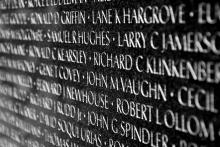
THIS YEAR MARKS multiple 50th anniversaries of the U.S. escalation of the war in Vietnam and the beginning of major anti-war protests. To mark the anniversary of the war, the Pentagon is sponsoring an official, multimillion dollar Vietnam War Commemoration to “thank and honor veterans.” This program has been criticized as a Vietnam whitewash and an attempt to rewrite history. The Pentagon commission will sponsor more than 1,000 events around the country that will have the effect of honoring the military and obscuring, behind a façade of false patriotism, the painful truths of the Vietnam War.
The Pentagon’s commemorations are missing any consideration of critical unlearned lessons, such as: 1) the Vietnam War was unjust and never should have been fought, 2) wars of military intervention have failed and should be avoided, 3) militarism and war have corrupted U.S. political decision-making, and 4) diplomacy, development, and peacebuilding strategies are preferable and more effective means of resolving international conflict.

WHAT IS OUR responsibility to expectant mothers, workers suffering from prolonged illness, or parents with children dealing with a significant sickness? Many Christians will assume the “our” in question refers to individual believers or the church as a community of believers. But what if the “our” refers to society as a whole? How is the question answered then?
This is more than an abstract question. Across the U.S.—at local, state, and federal levels—governments are debating policies that would expand paid sick leave. The issue itself isn’t complicated: Some workers have paid time off when they or a family member falls ill, while tens of millions of others—disproportionately low-wage workers—do not. The latter often face the difficult choice of struggling through shifts while sick or staying home and putting their livelihoods at risk.
The benefits of paid sick leave policies are well documented, with studies detailing the economic benefits paid sick leave provides by lowering employee turnover and training costs, reducing public-assistance spending, and improving productivity. “Working sick costs the national economy $160 billion annually in lost productivity,” according to the Journal of Occupational and Environmental Medicine. Even greater gains can be realized when expanded family leave policies are included.

THE DIALOGUES I am having with others in my late 30s are in contrast with the ones I had in my 20s when I was a single suburbanite. ... My aroused feminist perspective tempts me to say that traditional evangelical theology was adequate when I was living with a primarily masculine (in the Jungian sense) orientation to life, but has revealed deficiencies as I have related to life out of a more feminine consciousness.
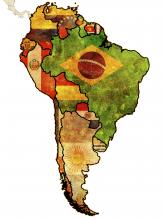
JON SOBRINO LAUGHS ever so slightly at my question. His office in the Monseñor Romero Center in San Salvador is a paper cavern, a place where a theological archeologist digging to understand the highs and the lows of liberation movements within the church would find a mother lode of artifacts.
Where is liberation theology going from here under Pope Francis? Sobrino, perhaps one of the most prolific liberation theologians, is thin and thoughtful. He considers his words: Liberation theology is a way of thinking about how a Christian must live—in active, engaged struggle for the flourishing of all life. Liberation is the primary movement of the Holy Spirit. It is the duty of those baptized into the life, death, and ministry of Jesus Christ to live this out, immediately and urgently.
In March 2013, when Argentine Cardinal Jorge Mario Bergoglio, Sobrino’s fellow Jesuit, became pope, liberation theologians and practitioners took a deep collective breath—what would happen next?
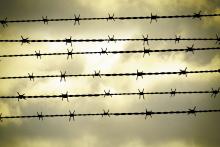
THERE'S NO BETTER sequel to the Senate Select Intelligence Committee’s executive summary of the torture report than Mohamedou Ould Slahi’s newly published Guantánamo Diary. This harrowing tale is only one of what someday will be many direct accounts by victims.
Originally from Mauritania, Slahi, 44, was detained on a journey home in January 2000 and questioned about the so-called Millennium plot to bomb the Los Angeles airport. Slahi admitted that he’d fought against Afghanistan’s communist government with the Mujahideen, at that time supported by the U.S. But he never opposed the United States. Authorities released him. A year and a half later, the young engineer was again detained and again released.
Months later, Slahi drove himself to a local police station to answer questions. This time, Americans forced him onto a CIA plane bound for Jordan, where he claims he was tortured. On Aug. 5, 2002, Americans brought him to Guantánamo. Slahi is among the detainees whose horrific torture there is the centerpiece of the Senate report. None other than then-Secretary of Defense Donald Rumsfeld signed the “special interrogation plan” authorizing his brutal ordeal.
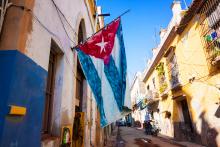
THOUGH SOME HAVE accepted “axis of evil” characterizations of Cuba and North Korea, my experiences of the two countries—nine visits to Cuba and one week in North Korea—have led me to far different conclusions: There are very few similarities between the two nations, and neither is inherently “evil.”
Music infuses the air in Cuba as in no other of the 60 countries to which I’ve traveled. The streets are alive. Children play baseball and soccer in the streets. Cafes, parks, and other public places are crowded and noisy. Nearly everyone I’ve met has treated me like a long-lost friend, even more so when they learn I’m American. There is a natural affinity between Cubans and Americans. More than 100 flights a week ferry people between Havana and Miami.
In North Korea, the streets are eerily quiet. There is virtually no visible human interaction. North Koreans are forbidden to make eye contact with Westerners. There appear to be no public gathering places except the massive government plazas where military parades and government rallies are staged. I was never allowed to go anywhere without a “minder.” I traveled with a Presbyterian Church (U.S.A.) official who was born in North Korea and returns there frequently. His counsel: “Assume that everywhere you go you are followed and that every conversation you have, no matter where, is bugged.” His relatives received permission to travel from their home village to Pyongyang to visit him. In our hotel room, he turned the television volume up to full blast before they began talking quietly. On one early morning walk near our hotel (the only time I was unescorted), I took a few photographs. By the time I returned to the hotel, government representatives were waiting in the lobby, demanding to see all my photos and instructing me on which ones to delete.

RELIGION AND electoral politics tend to be mutually debasing. Take the apparent exception, Jimmy Carter. His politics were informed by his theological insights: a regard for the poor and despised (he was the first U.S. president to take the Third World seriously); a sense of human limit (he did not take it for granted that Americans have a right to consume a disproportionate share of the world’s goods); and a recognition of the humanity of others, even of enemies (the Soviet Union was not the Evil Empire for him).
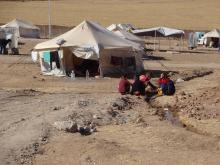
REV. KHALIL JAAR is a warm, passionate, and energetic man—and he needs to be. As the spiritual leader and “go to” guy for the 150 Iraqi Christian refugees living in his church in Amman, Jordan, he needs all the energy he can get.
When I met with Father Jaar at St. Mary, Mother of the Church congregation in Amman, it quickly became obvious how much he loves the refugees who now call this church home. Jaar, himself a refugee, knows something about the trials and tribulations of being forced to leave your home. He is the son of Palestinian refugees of Honduran descent. (His birth name is Carlos and he took the name Khalil when he became a Catholic priest.) He also knows something about the terror of war. Shortly after the 2003 U.S. invasion of Iraq, he was abducted in Baghdad where he was serving, and “only by the grace of God was I freed,” he says.
Jaar is especially dedicated to the education of the Iraqi children forced to leave everything they knew, including their schools. In his overcrowded office, full of stacks of papers and files, Jaar pulls out a large binder. This is his personal reference book, with a page for each child in his care. It includes a photo, a short history of their family and background, their education to date, and also notes about their extracurricular activities and likes, such as soccer and music. It is important to know as much as possible about each child, he says, and make sure that they continue their education.